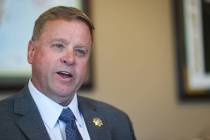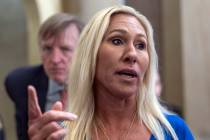Governor pitches cuts
CARSON CITY -- Gov. Jim Gibbons issued an eight-point plan Wednesday to cut state spending by implementing reforms to the public education system that include eliminating collective bargaining and the class-size reduction program.
Gibbons said in Las Vegas that his proposals would save the state $30 million to $100 million a year.
"The manner in which education is delivered to children should not be dictated by unions, which by definition promote only the interests of their members to the exclusion of other interests and stakeholders such as parents, school boards and most importantly students," Gibbons said in a statement.
Facing a tough primary as he seeks re-election to a second term, Gibbons touted his proposal as necessary in tough economic times.
A conservative Nevada think tank even praised it as a "day of hope for Nevada's children."
But legislative Democrats and Republicans alike criticized the proposal, saying it has little chance of passing the Legislature and might not be necessary if the state borrows the money as they have allowed.
Gibbons wants to repeal the law that allows collective bargaining by employees for schools, as well as cities and counties.
"Either salaries or benefits must be reduced, or jobs will be lost," he said. "This is true in education, government and the private sector."
He wants the Legislature in a coming special session to eliminate full-day kindergarten in some schools, issue vouchers to allow parents to send their children to private schools, and abolish the elected state Board of Education, which he would replace with five members appointed by him and the Legislature.
Gibbons also proposes to repeal a "hold harmless" clause that allows schools to receive current funding for two years after their enrollment begins to drop. He proposes "empowerment" plans that would allow school districts to decide how they spend state money.
And he proposes that the Legislature repeal a 2003 state law that prevents teachers from being evaluated on their students' test scores. The law prevents Nevada from qualifying for a $175 million federal Race to the Top education grant.
Democratic legislative leaders moved quickly to chastise the Republican governor.
"Once again, Governor Gibbons has chosen to place the burden of the state's economic crisis on the backs of Nevada's schoolchildren," said Senate Majority Leader Steven Horsford, D-Las Vegas. "It is our moral responsibility to make sure the next generation of Nevadans receives a high quality education."
"Rather than evaluate all possible solutions to Nevada's budget challenges, the governor has chosen to decimate our education system first," said Assembly Speaker Barbara Buckley, D-Las Vegas.
But the Nevada Policy Research Institute, a conservative Las Vegas-based think tank praised Gibbons' proposals.
"Today is a day of hope for Nevada's children, thanks to the governor's proposed education reforms," said institute analyst Patrick R. Gibbons. "For 50 years, Nevada education policy has misallocated spending to create union jobs, rather than educate our children. The results speak for themselves. While Nevada's inflation-adjusted, per-pupil spending has nearly tripled over the past 50 years, student performance has been stagnant."
Senate Minority Leader Bill Raggio, R-Reno, said Gibbons' plans have little chance of passing with Democrats holding control of both houses of the Legislature.
"These ideas can be looked at, but this agenda would be very difficult to pass," he said.
Both Raggio and Assembly Majority Leader John Oceguera, D-Las Vegas, said Gibbons might not have to call a special session if he uses a $160 million line of credit that was authorized by the Legislature last year. Governors set the agenda for special sessions.
Raggio and Oceguera also said Gibbons could work with the Legislature's Interim Finance Committee and move funds from next year's budget to the current budget.
"But that wouldn't help his re-election campaign," Oceguera said. "This is a political ploy to shore up his dismal approval rating.
Gibbons faces a tough June primary against former U.S. District Judge Brian Sandoval. A Review-Journal poll showed him trailing Sandoval 2-to-1 and having a 19 percent public approval rating.
In a recent interview, Gibbons said he did not want to use the line of credit since it was borrowing money that would have to be paid back.
Oceguera pointed out Gibbons released his plan to the news media while he was meeting behind closed doors in Las Vegas with legislators to discuss the economic problems.
"That is not sitting down and ironing out things with legislators so we can arrive at some consensus," Oceguera said. "I don't think the public wants us in Carson City for weeks and weeks to reform the entire education system when we have a $160 million line of credit. These proposals will hurt our schools and students and in the long run hurt our economy."
Gibbons said he will not call a special session before Jan. 22, when the state Economic Forum decides how much revenue will be available for state government to spend through June 30, 2011, the end of the state's two-year budget cycle.
Because of a $67 million revenue shortfall in the July-through-September quarter, Gibbons has asked state agencies and school districts to prepare for cuts of as much as 10 percent, or $436 million, because of declining tax revenue.
Ruben Murillo, president of the Clark County Education Association that represents teachers, said the governor is misguided in not trying to fix the state's revenue problem.
"Until we address the issue of Nevada's tax structure, the house will continue to fall," Murillo said.
He pledged to fight the proposed cuts, saying, "We will not stand idly by and watch as they try to dismantle the work of our predecessors."
Lynn Warne, president of the Nevada State Education Association, called Gibbons' proposal to eliminate class-size reduction, full-day kindergarten and other programs "outrageous."
She said as many as 2,000 teaching jobs would be eliminated by doing away with the two programs.
"It is unfortunate kids are being used as pawns in a political game," Warne said.
Warne said the per pupil funding (about $5,000 a year) that the state provides for each student already is among the lowest in the country.
But in a statement, Gibbons said the class-size reduction program has not produced results in its 20 years of existence, noting the 142 public schools in Nevada were judged as low-performing by the U.S. Department of Education.
Under class-size reduction, legislators provide addition funding to school districts to keep class sizes at a 1-to-16 student-pupil ratio in the first two grades and 19-to-1 in third grade.
Review-Journal reporters Benjamin Spillman and James Haug contributed to this report. Contact Capital Bureau Chief Ed Vogel at evogel@reviewjournal.com or 775-687-3901.




























